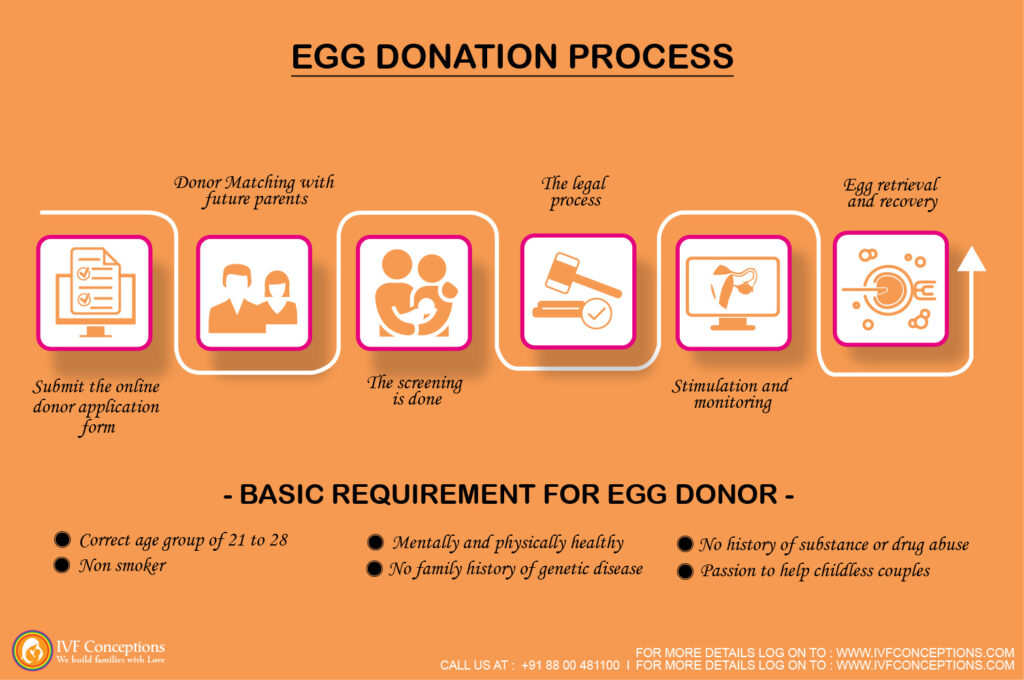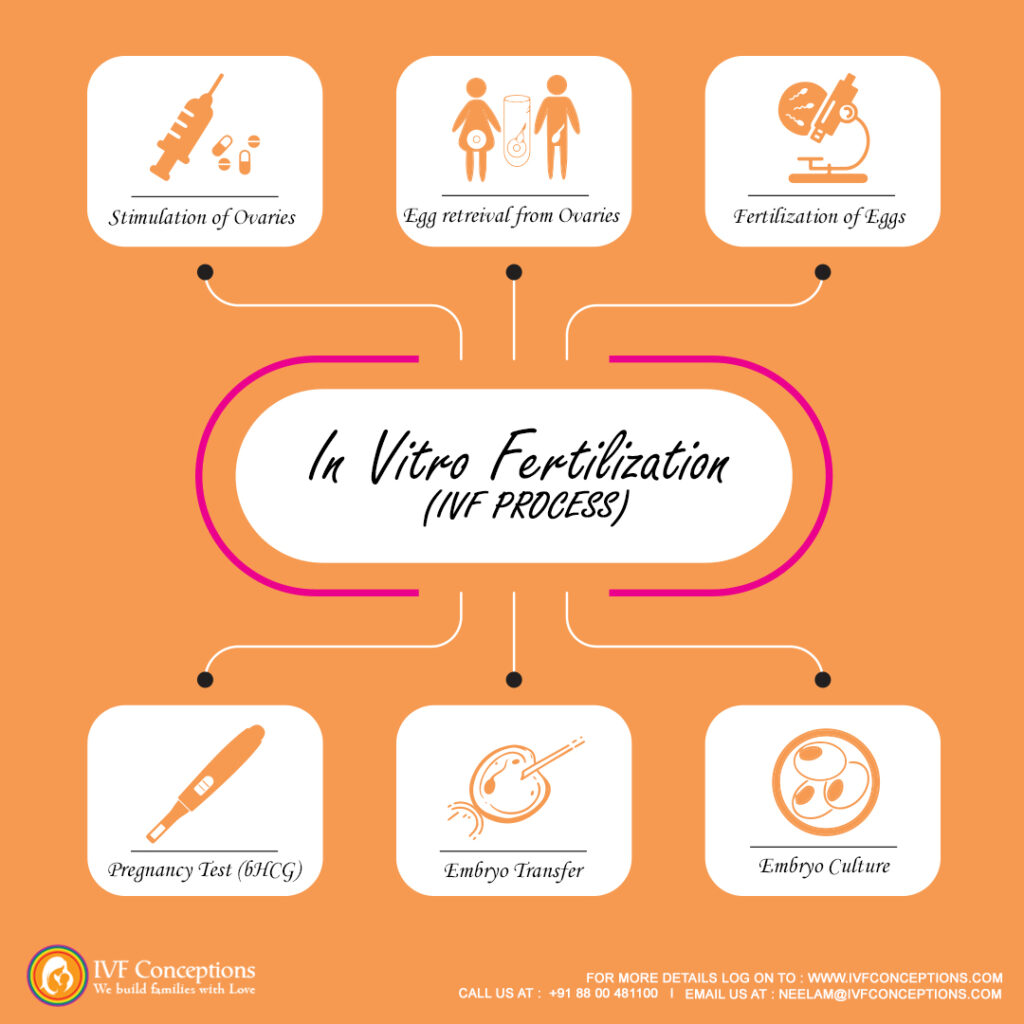IVF With Egg Donor Success Rates in 2025

The Definitive Guide to IVF with Egg Donor Success Rates
IVF With Egg Donor Success Rates in 2025 remains highly promising, often exceeding traditional IVF success rates. A healthy donor and advanced lab techniques significantly improve the chances of conception. This post explores how IVF with donor eggs compares to standard IVF and why it’s a top choice in assisted reproduction.
- Book an online appointment: Get a free online consultation.
- Call\W:+91-8800481100 Email:neelam@ivfconceptions.com
According to the Society for Assisted Reproductive Technology, in 2018, the average live birth success rate for IVF with an egg donor was 56.1% for women under 35, 43.0% for women aged 35-37, and 29.4% for women aged 38-40. The success rate decreased to 17.8% for women aged 41-42 and 5.5% for women over 42.
Additional guide for the egg donation process:
Best egg donor agencies near me
Egg donation process step-by-step guide
Success rates of egg donor agencies
Legal requirements for egg donation
The average cost of using an egg donor agency

IVF with egg donor success rate
According to the Society for Assisted Reproductive Technology (SART), the latest IVF success rates for cycles using donated eggs are:
- Pregnancy rates: Approximately 60%
- Live birth rates: Over 50%
These IVF success statistics demonstrate a higher likelihood of success compared to IVF cycles using a woman’s own eggs, especially for those over 35. Using donated eggs from young, fertile women best positions couples to achieve that long-awaited positive pregnancy test and welcome home a healthy baby.
IVF Success Rates: With Egg Donor vs Without
| Outcome | With Egg Donor | With Own Eggs |
| Pregnancy Rate | 60% | Varies by age: <35 years – 47%35-37 years – 33%38-40 years – 23% 41-42 years – 15%>42 years – 4% |
| Live Birth Rate | >50% | Varies by age:<35 years – 41%35-37 years – 26%38-40 years – 17%41-42 years – 10%>42 years – 3% |
Key Things to Note:
- Pregnancy and live birth rates are significantly higher with a healthy egg donor for any recipient, especially for women over age 35
- IVF success declines steadily when using own eggs as a woman ages, particularly after age 35
- However, by using an egg donor in her 20s-early 30s, any recipient can benefit from peak fertility rates
- Rates can vary slightly based on specific clinics, techniques, etc so discuss your personalized odds with your doctor
The much higher IVF success potentials demonstrate why many turn to egg donation. For women with lower ovarian reserve or advancing maternal age, an egg donor offers renewed hope for expanding families through IVF treatment.

Why are donor egg IVF pregnancy rates higher?
Younger women produce more viable eggs with a lower chance of chromosomal abnormalities. When you combine an egg from a woman in her 20s or early 30s with sperm, and then transfer the resulting healthy embryos, rates of implantation and development approach natural conception levels for her age.
While national averages shed light on IVF with donor egg success overall, specific rates can vary by clinic, technique, source of eggs, and recipient health factors. Working with a reputable fertility clinic skilled in managing egg donation IVF can further optimize your personal odds. Discuss your risk factors and treatment plan specifics with your physician.
Additional guide for intended parents:
Best surrogacy agency in India
Best surrogacy agency in Mexico
Best surrogacy agency in Colombia
Best surrogacy agency in Argentina
Best surrogacy agency in Georgia
Best surrogacy agency in the USA
Best surrogacy agency in Ukraine
Best surrogacy agency in Armenia
Conclusion
In the end, all those statistics boil down to holding your little one in your arms. For many, using donated eggs makes that dream come true through IVF treatment when other options have been exhausted. Knowing the favorable success rates empowers hopeful parents to take that next step.
If you’d like to learn more about IVF, Egg Donation, or surrogacy services globally, check out the rest of our website at Complete Surrogacy Agency. We offer legally secure and affordable surrogacy consulting services for FREE.
For more resources on IVF and Surrogacy, browse our other web page- IVF Conceptions.
For more resources on IVF and Surrogacy, browse our other web page- Georgia Surrogacy Agency.
Complete Surrogacy: Your Trusted Partner in International Surrogacy
At Complete Surrogacy, we have over 15 years of experience in international surrogacy, guiding 4,000+ intended parents worldwide. We provide safe, ethical, and affordable surrogacy solutions for single parents, LGBTQ+ couples, and heterosexual couples.
As members of EFS and ESHRE, we adhere to the highest ethical and professional standards. Our expert team is committed to providing accurate, compassionate, and transparent guidance, ensuring a legally secure and smooth journey to parenthood.
Let us help you build your family with trust, care, and integrity.
Get in touch for one FREE Surrogacy Consultancy!
Our team includes experts from diverse backgrounds with leading reproductive attorneys, professionally trained top fertility doctors, former surrogacy case managers, experienced and kind surrogate mother and egg donor coordinators, mental health professionals specializing in infertility counseling, and a logistic support team to assist you in your chosen surrogacy country.
References used:
FAQs for IVF with egg donor success rates
How does my age impact success rates with an egg donor?
While the egg donor’s age is most important, the recipient’s age can also influence pregnancy chances. Those under 35 may see slightly higher rates. Over age 45, success rates decline even with a young, healthy donor.
How many IVF cycles does it usually take to get pregnant with a donor?
Most achieve success in 1-2 transfers if genetically normal embryos are available. The SART reports over 80% will conceive with 6 or fewer transfers. This assumes embryos are viable and the recipient has a receptive uterus.
Do success rates differ between a first-time donor vs experienced donor?
There are no real differences in IVF success between a first-time donor and an experienced repeat donor assuming all other criteria are equal. Screening and proper treatment protocols matter most. An experienced donor does offer a track record of proven fertility.
Do frozen donor eggs have lower success compared to fresh?
No, in many cases the outcomes are equivalent. Cryopreservation techniques for freezing eggs have improved greatly. As with embryos, the freezing and thawing process itself should not reduce viability. Only the quality of the eggs themselves impacts the outcome.
What if our first IVF cycle fails, then what?
If genetically normal embryos fail to implant or you miscarry, most clinics allow 1-2 more attempts as part of an egg donor guarantee program. Then a new donor may be advised or alternatives like gestational surrogacy evaluated depending on your specifics.

Author Bio: Neelam Chhagani is an International Surrogacy Expert with 15 years of experience in the fertility and surrogacy domain. As the founder of IVF Conceptions and Complete Surrogacy, she has guided over 4,000 intended parents worldwide on their surrogacy journey to parenthood. Recognized as a trusted authority, she specializes in holistic infertility solutions and third-party reproduction consulting.
Holding an MA in Counselling Psychology and a PGD in Mental Health, Neelam is a proud member of the European Fertility Society (EFS) and the European Society of Human Reproduction and Embryology (ESHRE). She is also a leading surrogacy blogger, providing valuable insights into ethical and practical surrogacy solutions.
Since 2010, committed to supporting ALL family types, Neelam has been passionate about helping intended parents grow their families with compassion, integrity, and a focus on secure and affordable surrogacy options Globally.
Learn more about Neelam:
https://www.ivfconceptions.com/neelam-chhagani-surrogacy-consultant/
https://www.linkedin.com/in/neelam-chhagani-92892229/















I was introduced to Neelam by a friend who worked with Neelam for surrogacy. Neelam is absolutely wonderful. I am a single male and the journey to fatherhood is not that easy. Neelam connected me to a program ideal for my circumstances. She was with me throughout the pregnancy providing advice and guidance along the way. I am so grateful I found her and am thrilled today that I have a beautiful daughter. I highly recommend Neelam to anyone who is on a journey to become a parent. Having a child has changed my world for the better. I wish others success with their own journey and recommend you connect with Neelam to find a path that is best for you.
SA (USA)